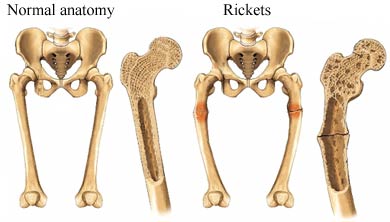Rickets Information
Click here to scroll to the list of available medications ↓
Without vitamin D, the body is unable to absorb calcium and phosphorus and use it to strengthen bones, especially in growing bodies. Rickets is the condition caused, typically in children, where the bones soften usually due to a lack of vitamin D. The body will react to a vitamin D deficiency by taking the calcium and vitamins it requires from the skeletal structure.
Skeletal deformities are usually the first sign of rickets. Bowed legs, breastbone projection from the chest, unusual curvature of the spine, and pelvic deformities can happen rather quickly. Other symptoms may include dental problems, fragile bones or numerous broken bones, failure to grow, muscle weakness, and bone pain.
A lack of sufficient sunlight can contribute to vitamin D deficiencies. Additional causes are likely to include dietary deficiencies. In some cases, although rare, the patient may be receiving ample vitamin D but has a family genetic trait that causes rickets. In these cases the kidney are unable to retain phosphorus and thus present the same issues as a patient who does not receive enough vitamin D.

A lack of vitamin is more readily found in breast fed infants who do not receive a vitamin D supplement. A breast feeding mother may have a difficult time keeping ample vitamin D in her system as her own body has much higher demands than normal during pregnancy as well as breast feeding. Other risk factors for rickets include family history, and poor nutrition.
A physical examination is required to help determine if rickets is present. Following a physical examination blood tests to measure the calcium and phosphorus levels in the blood may be necessary. X-rays can show the bone loss and to what degree the bones have suffered. A family history should be taken to help determine the cause of rickets. Kidney problems or celiac disease, or even a close relative such as a sibling or parent with a history of rickets can often help determine the cause of rickets.
Once rickets is diagnosed it is very easy to treat regardless of the cause. However, untreated rickets can cause serious complications. A basic failure to grow and reach normal developmental milestones, difficulty with basic motor skills, dental problems, an increase in the susceptibility to infections, seizures, and deformities of the skeletal structure are all possible within a fairly short time frame of developing rickets.

Treatment options are effective and are typically relatively simply to implement. Naturally, if there is an underlying cause such as kidney problems or celiac disease, treating the underlying condition will solve the rickets. Introducing higher levels of vitamin D and phosphorus into the patient’s daily diet is likely to show results in a matter of weeks in children if dietary issues are the cause. Spending extra time in the sunlight can also help the body absorb more vitamin D.
Of course changing a pediatric patient’s diet may be met with severe resistance. While nutrients received from food are best, supplementation is an option while the child adjusts. In some cases, parental nutritional education may be required to help the adult of household learn better nutritional habits which affect the whole family.
Some cases of spinal deformities or leg bowing may require bracing in order to encourage proper alignment during growth. There is a risk of the pediatric patient growing up with misaligned bone structure after experiencing rickets. Bracing will help the bones grow in a more suitable and proper alignment to help prevent future problems. Some cases of bow legged or spinal deformities may require surgical correction while the pediatric patient is still growing.
Preventing rickets is much easier than treating it. Nutritional support for pregnant women and women who are nursing and raising small children should be part of every physician’s basic treatment plan. Helping to spread awareness can help knock out the problem altogether. Families that can not afford adequate nutrition should be assisted in finding subsidized programs to help provide proper nutrition for their families.